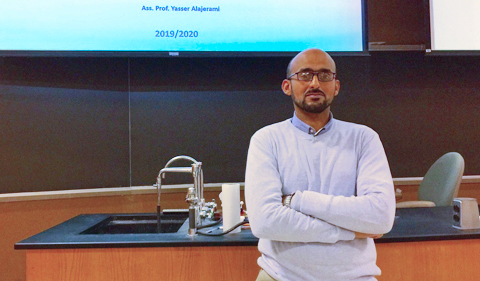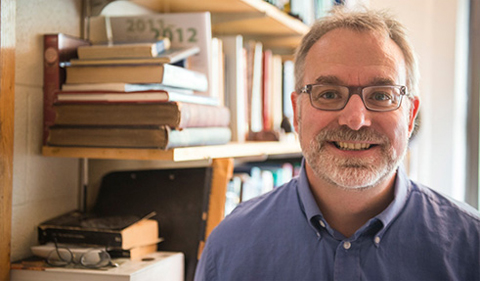By Ling Xin
NQPI Editorial Intern
Fulbright Scholar Dr. Yasser Alajerami from Al-Azhar University-Gaza discussed his latest research on a new type of glass material that could be used as a protective shielding at radiation facilities.
Alajerami is a Fulbright Scholar at Ohio University for 2019-20.
At an Ohio University Nanoscale and Quantum Phenomena Institute seminar on Oct. 17, Alajerami said that extensive exposure to high-energy radiations such as X-rays can damage human DNA and cause cancer, and wall and glass shielding have been used to protect operators at such radiation facilities. However, most shields being used today are lead glasses, which are not only expensive but also toxic.
Alajerami’s group has prepared a new type of shielding material by adding heavy metal oxide – bismuth oxide (Bi2O3) and cadmium oxide (CdO) – to borate glass samples (B2O3).
“Bismuth is an excellent absorber of photon radiations, while cadmium helps maintain the transparency of the glass,” Alajerami said. They found that the glass composition of 30 percent Bi2O3, 15 percent CdO, and 55 percent B2O3 had the best durability and shielding performance.
“We have already submitted two manuscripts based on this study,” he said. The next steps are to broaden the energy range of radiations for more tests and then to switch to other types of radiations such as neutron radiation.
Alajerami said his work has benefited a lot from the experiment facilities in the physics and chemistry departments, as well as the generous support of NQPI for the chemicals and crucibles used in those experiments, which are costly. He arrived in Athens in August, and he feels he has much to do in the next few months.
“I want to make use of the resources I didn’t have in my own country and produce some good results.”
As a Fulbright Scholar at OHIO, Alajerami is very grateful to the International Institute for Education for its great support and to his host Dr. David Drabold, Distinguished Professor of Physics & Astronomy, and collaborators Dr. Gang Chen, Associate Professor of Physics & Astronomy, and Dr. Katherine Cimatu, Associate Professor of Chemistry & Biochemistry.




















Comments